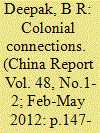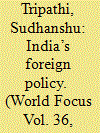|
|
|
Sort Order |
|
|
|
Items / Page
|
|
|
|
|
|
|
| Srl | Item |
| 1 |
ID:
113713


|
|
|
|
|
| Publication |
2012.
|
| Summary/Abstract |
Relying on primary sources in India and China, especially British intelligence reports, this essay attempts to reconstruct colonial era linkages between the two countries from 1905 to 1930. In the first section, the essay examines the connections that Indian nationalists and revolutionaries had with leading Chinese nationalists such as Sun Yat-sen and Zhang Taiyan in Japan and mainland China, and their attempts to devise strategies to dislodge the British from India through armed struggle. This part also discusses the support and sympathy of the Chinese nationalists for the Indian people and the Indian cause. The second section deals with the nature of Ghadar activities in various centers across China such as Hong Kong, Shanghai, Hankou, Nanjing and Beijing and posits that during the initial phase (1913-18), Ghadar activists acted independently and tried to enlist the support of the Chinese nationalists and Germans to procure arms and ammunition for overthrowing the British in India. During the second phase, however, owing to the Bolshevik revolution and the First United Front between the Communists and Nationalists in China, Ghadar activists began vying for the support of both Chinese parties. They were successful in this regard and in turn supported the campaign against the warlords, and even offered their services for the national cause of China. This essay argues that Ghadar nationalists played a pioneering role in uniting the peoples of China to support the fight for Indian independence. Even if much of our information about these national heroes is obtained through British intelligence reports, which are far from comprehensive, let alone objective, it still tells us a great deal about an era in which the revolutionaries of India and China extended helping hands towards each other.
|
|
|
|
|
|
|
|
|
|
|
|
|
|
|
|
| 2 |
ID:
141592


|
|
|
|
|
| Summary/Abstract |
India’s Foreign Policy, under its first Prime Minister Nehru, had been well-known for its strict adherence to non-alignment vis-à-vis international conflict while focusing on anti-colonialism, anti-imperialism, anti-racialism and apartheid besides world peace through panchsheel. This pacifist diplomacy was neither to result into blind submission or compliance of super or major powers nor should it prevent the development of strategic alliances that strengthen the country’s position in the international system. In fact, it was particularly aimed at achieving self-sufficiency for ensuring the country’s economic development as a precondition of political and social progress, stability and harmony. Perhaps Nehru had no faith in free trade, globalization and economic liberalization and foreign investment as instruments of socio-economic progress. Later Prime Ministers Lal Bahadur Shastri, Indira Gandhi and Rajiv Gandhi abandoned the idealistic vision of Pt. Nehru and pursued a more realistic foreign policy for securing the country’s national interests in the World. After the demise of Cold War, the foreign policy under PM NarasimhaRao and Dr.Manmohan Singh took several new steps like supporting globalization and economic liberalization, close cooperation or strategic partnership with the United States, forging ties with Israel and many more. India has now drawn lessons through various unprecedented incidents at the international level that the road to socio-economic development passes only through globalization and liberalization and global interconnectedness and interdependency. This was stated by PM Manmohan Singh: “Our government has
|
|
|
|
|
|
|
|
|
|
|
|
|
|
|
|
|
|
|
|
|